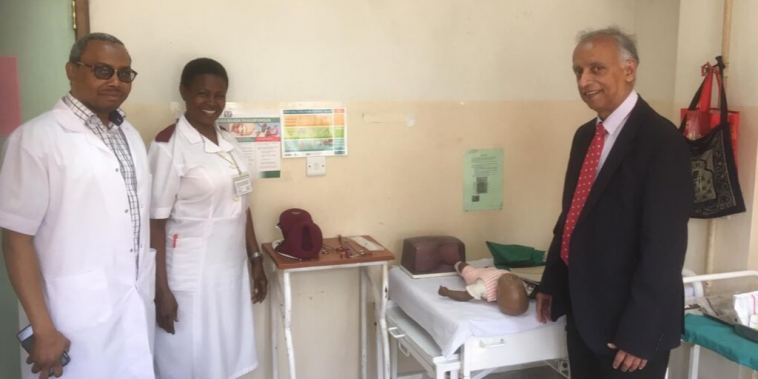Sir Arul, Postpartum Family Planning Champion
FIGO Past President Sir Prof Sabaratnam Arulkumaran’s research and clinical interests reflect a lifetime of work to understand and improve the quality of care for women and newborn babies.

In 2013 he played a leading role in developing FIGO’s Postpartum Intrauterine Device (IUD) Project, a family planning partnership in six countries that have relatively high fertility rates, high maternal mortality rates, and significant unmet need for contraception. The project has so far enabled more than 730,000 women to make an informed choice about their family planning needs.
The professor and FIGO Past President (2012-2015) spoke to FIGO about the history, impact and hope for long-term success of the Postpartum Intrauterine Device (IUD) Project, and progress towards achieving women’s health and rights.
“There are several pressing issues in women’s health, but in 2013 I decided to focus on family planning because we know it can transform women’s health and well-being.
Every woman has the right to decide as to when she would like to have her next child, and how many children to have. With childbirth becoming increasingly institutional, we saw a growing opportunity to counsel women to consider family planning when they came to a facility to give birth.
Putting local leadership at the heart of our Postpartum IUD work has a long-term impact. OBGYNs and midwives are an integral part of any society, and most of them are members of their national societies. FIGO, as a federation of 132 National Member Societies with strong multi-disciplinary partnerships, can mobilise individuals to get directly involved. We see how acceptance and implementation of postpartum family planning (PPFP) at national level influences individual healthcare providers to take up the issue as part of their professional responsibility.
For instance, I recently returned from Tanzania, where I gave clinical lectures and spent time with our project partner, the Tanzania Midwives Association (TAMA). IUD counselling and insertion by midwives and doctors is now included in the Tanzanian midwifery, medical students and postgraduate curriculum. Ample resources provided by FIGO to practise counselling and insertion means that it has become embedded as part of routine practice.
I left Dar es Salaam proud to see how our initiative has made it possible for women to access long-acting reversible contraceptives (LARCS) for birth spacing, and reduced the need for permanent methods such as sterilisation. With increasing government involvement, women in Tanzania are also being offered hormonal implants, providing more choices for women. There is awareness and enthusiasm amongst OBGYNs and midwives to offer PPFP to help reduce maternal deaths and improve health.
I firmly believe our National Member Societies and in-country partners will work with governments to sustain and slowly replicate this success, but we know that there is significantly more to be done.
UNFPA has set strong targets as we look towards the upcoming Nairobi Summit marking the 25th anniversary of the International Conference on Population and Development (ICPD), and these are all essential goals if we are to improve women’s health and rights:
- Zero unmet need for family planning;
- Zero preventable maternal deaths, and
- Zero violence and harmful practices against women and girls, including female genital mutilation and child marriage.
We need to work together as a coalition: government, public and professional organisations, NGOs and the private sector. We need definitive plans for appropriate projects, owned and led by the populations they impact. We need investment on many levels: personal, professional and infrastructure.
I believe that FIGO has a unique role to play in the years ahead. As a federation, we have the human capital of OBGYN professionals and their National Member Societies in 132 countries. We can draw on the wide expertise of members who have worked extensively on the full package of sexual and reproductive health and rights, which includes contraception, safe abortion and safe maternity care.
The scientific and technical expertise of FIGO Committees can help to bring about the changes needed to achieve the 2030 Agenda for Sustainable Development, especially SDGs 3, 5 and 17, and can help achieve UNFPA’s mandates.
We need to work hard and work together to ensure that women achieve their health and rights, without compromising their identity or dignity.”
Learn more about FIGO’s Postpartum IUD Project, and view our supplement in FIGO’s peer-reviewed journal IJGO.